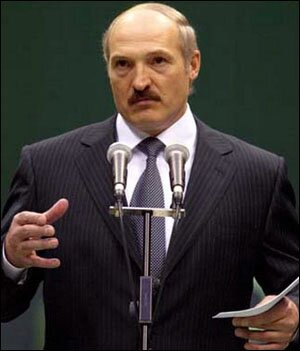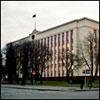Другие материалы рубрики «English»
-
 Human rights groups condemn European Olympic Committees for “sportswashing” human rights abuses in Azerbaijan
Human rights groups condemn European Olympic Committees for “sportswashing” human rights abuses in Azerbaijan
The coalition also condemns EOC President Patrick Hickey for praising the Azerbaijani leader, Ilham Aliyev. -
 Kobryn-based opposition activist Ales Mekh launches presidential bid
Kobryn-based opposition activist Ales Mekh launches presidential bid
Apart from Mr. Mekh, six persons have already announced their intention to run in this year’s presidential election...
- Quarter of adult Belarusians are smokers, official statisticians say
- Experts draw up media reform “roadmap” in framework of Reforum projec
- Leader of Belarusian Popular Front skeptical about new Nyaklyayew-led movement
- Authorities have no plans for liberalization, Belarusian Popular Front leader says
- Second session of pro-independence congress expected to be held in Minsk on June 7
- Rescuers stage massive exercise at sports center in Minsk
- Revelers in Minsk celebrate end of Butter Week
- Leaders of France, Germany, Russia, Ukraine arrive in Minsk for summit on Ukraine crisis
- United Kingdom’s Visa Application Center in Minsk moves into permanent office
- Minsk residents paying tribute to victims of Charlie Hebdo massacre in Paris
English
Lukashenka turns 56
Alyaksandr Lukashenka turned 56 on August 30. According to the Belarusian leader’s press office, on his birthday, Mr. Lukashenka was on a working trip to the Homyel region, as quoted by BelaPAN.
 Mr. Lukashenka was born in the village of Kopys, Vitsyebsk region, on August 30, 1954. He graduated from the history department of the Mahilyow Teachers' Training Institute in 1975. In 1975-77, he served with the KGB Border Troops. Then he worked as a secretary of the Young Communist League at a trade enterprise in Shklow, Mahilyow region. In 1978, he became a secretary at the Shklow district office of the Znaniye (Knowledge) association, which propagandized atheism. In 1980-82, he again served with the Soviet Army.
Mr. Lukashenka was born in the village of Kopys, Vitsyebsk region, on August 30, 1954. He graduated from the history department of the Mahilyow Teachers' Training Institute in 1975. In 1975-77, he served with the KGB Border Troops. Then he worked as a secretary of the Young Communist League at a trade enterprise in Shklow, Mahilyow region. In 1978, he became a secretary at the Shklow district office of the Znaniye (Knowledge) association, which propagandized atheism. In 1980-82, he again served with the Soviet Army.
In the period between 1982 and 1985, Mr. Lukashenka was deputy director general of a building materials enterprise in Shklow. He also studied by correspondence at the Horki Agricultural Academy in the Mahilyow region and graduated from it in 1985. In 1985-87, he was chairman of the Communist Party cell in a collective farm in the Mahilyow region. In 1987, he was appointed to head a state farm called Haradzets in the Shklow district.
In 1990, he was elected to the Supreme Soviet of Belarus (parliament). In April 1993, he became chairman of the Supreme Soviet's anti-corruption commission. His reports, full of accusations against high-ranking officials, made him widely popular.
Mr. Lukashenka was elected president of Belarus in relatively free and fair elections in the summer of 1994, when voters warmed to him as a "man of the people" running against an aloof figure from the country's Soviet-era elite. In the first round of the elections, he reportedly won 44.8 percent of the vote, compared with 17.3 percent for second-place Prime Minister Vyachaslaw Kebich. In the runoff round, he received 80.1 percent against Mr. Kebich's 19.9 percent.
As a result of a constitutional referendum in November 1996, he extended his presidential term by two years to 2001.
In September 2001, he was reelected president for a new five-year term. The central election commission announced that he won 75.6 percent of the vote, compared with 15.4 percent for the united opposition's candidate, trade union leader Uladzimir Hancharyk, and 2.5 percent for Liberal Democratic Party leader Syarhey Haydukevich.
In 2004, he initiated a national referendum on the removal of the two-term constitutional limit on the presidency. According to the central election commission, Mr. Lukashenka won a sweeping victory, with 79.4 percent of all registered voters saying "yes" to allowing him to stand for reelection for a third term.
In March 2006, Mr. Lukashenka was declared the winner with 83 percent of the vote in a presidential election condemned by his opponents as a farce.
Opposition candidates Alyaksandr Milinkevich and Alyaksandr Kazulin reportedly gained 6.1 and 2.2 percent, respectively, and Mr. Haydukevich was said to have received 3.5 percent. An independent survey found that Mr. Lukashenka won 63.6 percent of the vote and Mr. Milinkevich received 20.6 percent.




В настоящее время комментариев к этому материалу нет.
Вы можете стать первым, разместив свой комментарий в форме слева